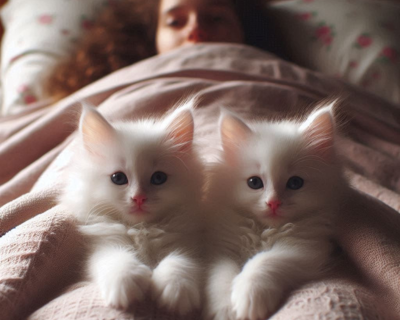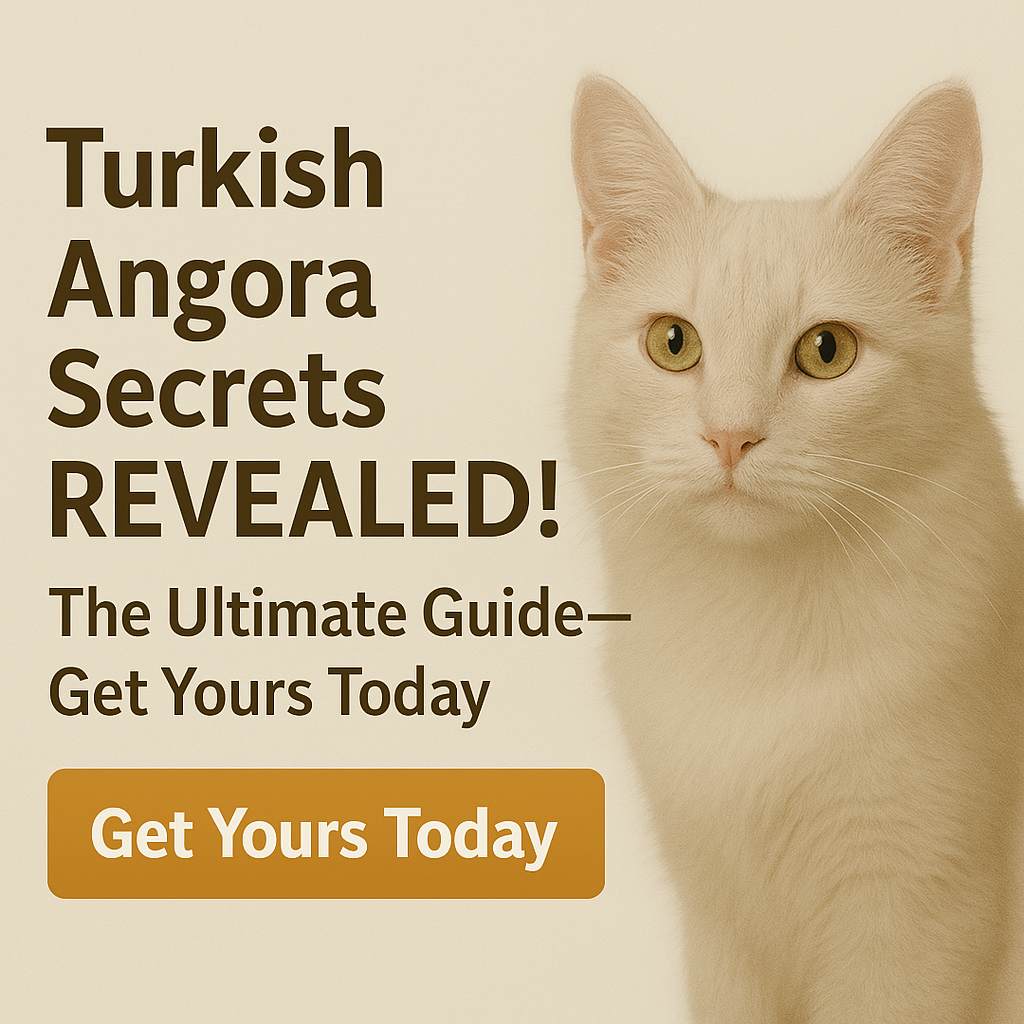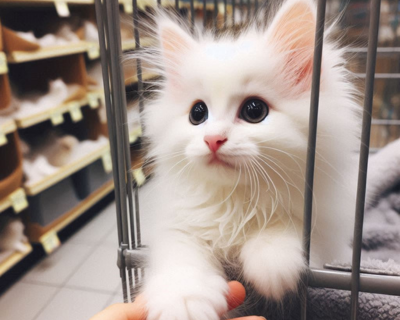Introduction: The Alluring Turkish Angora
The Turkish Angora is a breed of cat that effortlessly captures attention with its refined beauty. Often adorned with a long, flowing, silky coat, frequently in a pristine white hue, these felines possess striking eyes that can range in color from brilliant blues and greens to captivating ambers. Beyond their physical allure, Turkish Angoras are known for their engaging personalities, often described as playful, intelligent, and deeply affectionate. These cats exude an air of elegance and grace, yet beneath their sophisticated exterior lies a lively and curious companion eager to interact with their human families.
This guide aims to help individuals in the Cheektowaga, New York area who are considering welcoming a Turkish Angora kitten into their homes. We'll explore potential avenues for finding these delightful kittens, both through reputable breeders and local adoption options. Furthermore, we'll delve into the essential aspects of the breed's characteristics, including their temperament, activity levels, and grooming needs, to ensure prospective owners can make an informed decision. Health considerations, important questions to ask when acquiring a kitten, and the associated costs will also be thoroughly examined to provide a comprehensive overview for anyone looking to embrace the joys of Turkish Angora ownership.
Finding Your Turkish Angora Kitten: Local and Beyond
Reputable Breeders in the Cheektowaga Area (and Nearby)
Choosing a reputable breeder is paramount when seeking a Turkish Angora kitten. A responsible breeder prioritizes the health and well-being of their cats, possesses extensive knowledge of the breed, and is committed to producing kittens with sound temperaments. These breeders typically conduct health testing on their breeding stock to minimize the risk of genetic diseases, provide their kittens with a clean and stimulating environment, and are often involved with breed clubs or associations that promote the breed's standards. They will readily offer health guarantees, detailed vaccination records, and are usually more than willing to answer any questions and provide ongoing support to new owners.
While a search for breeders specifically located in Cheektowaga might not yield immediate results, exploring options in the wider Western New York area and even considering reputable breeders from other regions who might ship kittens is advisable. Chateaumane Turkish Angoras, situated in West Michigan, exemplifies a breeder with a strong focus on preserving the breed. Their program emphasizes optimal health, sound temperament, correct breed type, and longevity. They are registered with the Cat Fanciers Association (CFA) and conduct health testing, including screening for Hypertrophic Cardiomyopathy (HCM). Although not local, their dedication to responsible breeding practices makes them a noteworthy resource.
Similarly, Antioch Cattery, located in central Ohio, offers home-raised Turkish Angora kittens and has experience shipping them to various locations within the United States. They are respected members of The International Cat Association (TICA) and occasionally participate in CFA shows.
General online breeder directories, such as Breedlist, might not always have comprehensive listings for Turkish Angora breeders in a specific local area. Therefore, it is beneficial to consult breed-specific registries like the Traditional Cat Association (TCA), which maintains an online registry of breeders. Furthermore, both the CFA and TICA are prominent cat registries that have "Find a Breeder" directories on their respective websites, offering a direct way to connect with registered breeders of Turkish Angoras. The absence of readily apparent local breeders in the immediate Cheektowaga area suggests that prospective owners might need to broaden their search to nearby cities like Buffalo or consider breeders in other states who adhere to high standards of ethical breeding.
Top Resources to Find Turkish Angora Breeders
- Cat Fanciers' Association (CFA) - https://cfa.org/
- The International Cat Association (TICA) - https://tica.org/
- Traditional Cat Association (TCA) - https://breeds.tcainc.org/
- Chateaumane Turkish Angoras - https://chateaumanecats.com/
- Antioch Cattery - https://www.angelfire.com/oh/turkishangora/index.html
Local Animal Shelters and Rescue Organizations
Adopting a cat from a local animal shelter or rescue organization can be a profoundly rewarding experience. Many wonderful cats, including purebreds or mixes, find their way into shelters through various circumstances and are in need of loving homes. While the availability of Turkish Angora kittens in shelters can vary, it is always a worthwhile avenue to explore.
Several animal welfare organizations serve the Cheektowaga and surrounding Erie County areas. Ten Lives Club, with multiple locations including Blasdell, Depew, East Aurora, West Seneca, Cheektowaga, Buffalo, East Amherst, and Hamburg, is a dedicated cat rescue organization. Their website features a database of cats currently available for adoption. GrandView Animal Care Center in Cheektowaga, primarily a veterinary clinic, might occasionally have information about adoptable animals in the community. Allie and Pals Rescue, also located in Cheektowaga, adopts out pets within a 1.5-hour radius of Buffalo and can be contacted for inquiries about available cats.
The SPCA Serving Erie County, situated in West Seneca, is a major animal welfare organization with adoptable animals listed on their website and handles issues related to domestic cats. Tabby Town, a cat adoption center and rescue cooperative in Blasdell, is another local resource focused specifically on felines. Additionally, Cheektowaga K9 Wazi is listed as an adoption shelter for dogs, cats, and other pets. Online searches on platforms like home-home.org have even yielded results for Turkish Angoras in the Buffalo area, such as a five-year-old cat named Thomas Bose.
Although the research does not explicitly confirm the current availability of Turkish Angora kittens in these specific local shelters, their inventory of adoptable animals changes frequently. Therefore, it is strongly recommended to regularly check their websites and contact them directly to inquire about the possibility of finding a Turkish Angora kitten or cat in their care.
Local Shelters & Rescue Organizations Near Cheektowaga, NY
| Organization | Location | Focus |
|---|---|---|
| Ten Lives Club | Multiple including Cheektowaga | Cat rescue organization |
| GrandView Animal Care Center | Cheektowaga | Veterinary clinic with adoption info |
| Allie and Pals Rescue | Cheektowaga | Adopts pets within 1.5hr of Buffalo |
| SPCA Serving Erie County | West Seneca | Major animal welfare organization |
| Tabby Town | Blasdell | Cat adoption center |
| Cheektowaga K9 Wazi | Cheektowaga | Adoption shelter for dogs, cats, etc. |
Online Resources and Listings
The internet offers a vast array of resources for finding pets available for adoption or sale. Reputable online platforms connect potential adopters with shelters and rescues across a wide geographical area. Adopt-a-Pet.com is one such platform that allows users to search for specific breeds like the Turkish Angora in desired locations. While initial searches for Cheektowaga might not show immediate results, the platform allows browsing nearby cities such as Hamburg and Buffalo and offers the option to set up email updates for new listings.
Chewy.com also features a section for adoptable Turkish Angoras; however, the listings are nationwide, indicating that local availability on this platform might be limited. Nevertheless, Chewy.com allows refining searches by ZIP code or city, making it another avenue to explore. Petfinder.com is another well-known platform where local rescues like Allie and Pals Rescue list their adoptable pets. While some Turkish Angoras are listed on Petfinder in other parts of New York, such as New York City, it remains a valuable resource for searching in the Cheektowaga area as well.
Beyond general pet adoption platforms, it is worth seeking out breed-specific rescue organizations. Although the research did not identify any Turkish Angora-specific rescues directly serving the Cheektowaga area, Zani's Furry Friends ZFF, Inc., located in New York, NY, appears to frequently have Turkish Angoras and Turkish Angora mixes available for adoption. Notably, this rescue mentions adopting out of state and, in some cases, arranging transportation for their animals. This highlights that considering rescues located further away could be a viable option for finding a Turkish Angora kitten. The prevalence of Turkish Angoras in rescues based in major metropolitan areas suggests that the breed might be more concentrated in certain regions, necessitating a broader search strategy for those in the Cheektowaga area.
Understanding the Turkish Angora Breed: Is It the Right Fit for You?
Temperament and Personality: A Lively and Engaging Companion
The Turkish Angora is renowned for its captivating temperament, often described as graceful, social, and even a bit mischievous. These cats are known to form strong bonds with their human families, earning the reputation of being "furry shadows" who love to follow their people around and be involved in their activities. Their playful and affectionate nature makes them delightful companions, often retaining a kitten-like energy throughout their adult lives. They are also highly intelligent and curious, often exploring their surroundings with enthusiasm and even learning to open cabinets, which might necessitate child locks in some households.
Turkish Angoras are known for their athletic prowess and enjoy climbing to high vantage points like bookshelves and cabinets, showcasing their agility. They often enjoy interactive play, including games of chase and even fetch, and some have a particular fondness for water, occasionally joining their owners in the shower or playing in the bathtub. While they crave attention and interaction, they are generally not as demanding as some other breeds and can be content with their own company if provided with enough toys and stimulation. However, they will typically greet their owners with enthusiasm upon their return.
These cats can be quite talkative, often engaging in animated conversations with their human companions, earning them the comparison to the "border collies of the cat world" due to their sociability. They can be quick-witted and sometimes possess a slightly quick-tempered nature. Some owners report that their Turkish Angoras can be clingy and do not enjoy being left alone for extended periods, while others note their potential for stubbornness. In multi-pet households, a Turkish Angora might assert themselves as the "alpha cat". Overall, their engaging and interactive nature means they thrive in homes where they receive ample attention and have opportunities for play and exploration.
Is a Turkish Angora Right for You?
Turkish Angoras thrive in environments where they can receive plenty of attention and interaction. Consider your lifestyle and whether you can provide:
- Daily playtime and mental stimulation
- Opportunities for climbing and exploring
- Regular social interaction (they don't like being alone for long periods)
- A patient approach to their sometimes "alpha" personality
- Appreciation for their talkative nature
If you're looking for a laid-back, independent cat that requires minimal interaction, the Turkish Angora may not be the best match for your home.
Energy Levels and Exercise Needs: An Active and Agile Breed
Turkish Angoras are an active and energetic breed that requires a significant amount of exercise and mental stimulation to remain happy and healthy. Their high activity level means they need regular opportunities for play, and they particularly enjoy activities that allow them to climb, jump, and explore. Providing them with cat trees, shelves, and other vertical spaces is essential to satisfy their natural inclination to be up high. Interactive toys that engage their hunting instincts, such as toy mice or crumpled paper, are also highly recommended. Many sources suggest dedicating at least 15 to 30 minutes each day to interactive playtime with your Turkish Angora to help them expend energy and strengthen the bond between you.
Their agility and intelligence make them well-suited for activities like feline agility, further highlighting their need for physical and mental challenges. Some Turkish Angoras even enjoy leash walking or exploring cat-safe outdoor enclosures, providing additional avenues for exercise and enrichment. The description of them as "ballerina-like" and the comparison to the energetic Border Collie underscore their need for an active lifestyle. Without sufficient exercise and stimulation, they can become bored and may exhibit mischievous behaviors such as opening cabinets or turning on faucets in search of attention. Therefore, potential owners should be prepared to provide ample opportunities for their Turkish Angora to run, climb, play, and explore to ensure their well-being.
Recommended Toys for Turkish Angoras
Given their playful and active nature, Turkish Angoras benefit from a variety of toys to keep them engaged:
- Interactive wand toys with feathers or strings
- Puzzle feeders to challenge their intelligence
- Ball tracks or circuit toys
- Small stuffed toys they can carry and "hunt"
- Climbing trees and wall-mounted shelves
For more ideas on keeping your Turkish Angora entertained, check out our guide to Turkish Angora Cat Toys.
Grooming Requirements: Surprisingly Low Maintenance
Despite their luxurious, medium-to-long coats, Turkish Angoras are surprisingly low-maintenance when it comes to grooming. Their single coat, lacking a dense undercoat like some other long-haired breeds, makes them less prone to tangles and matting. Weekly brushing with a comb or soft brush is generally sufficient to keep their coat in good condition, remove loose hairs, and maintain its silky sheen. Some owners appreciate the opportunity for daily brushing as it provides a chance for bonding.
While they are generally good at self-grooming, occasional baths might be necessary, particularly for white or light-colored Angoras, to keep their coats bright. Fortunately, many Turkish Angoras have an affinity for water, which can make bath time less challenging than with other breeds. Establishing a grooming routine early in a kitten's life is recommended. In addition to brushing, regular nail trimming, ear cleaning, and dental care, including daily tooth brushing with vet-approved toothpaste, are essential components of their overall grooming routine. Overall, while their elegant appearance might suggest high grooming demands, the Turkish Angora's grooming needs are relatively simple, requiring only a modest amount of regular attention.
Health and Lifespan Considerations: Understanding Potential Issues
Common Health Issues and Genetic Predispositions
Turkish Angoras are generally considered a healthy breed with a good lifespan. However, like all breeds, they can be predisposed to certain health conditions. One notable concern is hereditary deafness, which is more prevalent in white Turkish Angoras, especially those with blue eyes or odd-colored eyes (heterochromia). This condition is linked to the same gene responsible for their white coat and blue eye color. Breeders may conduct a BAER (Brainstem Auditory Evoked Response) test to assess a kitten's hearing ability.
Another potential health issue is Hypertrophic Cardiomyopathy (HCM), the most common form of heart disease in cats, which involves a thickening of the heart muscle. Responsible breeders often screen their cats for HCM using echocardiography. Hereditary ataxia, a neurological disorder affecting coordination, is another condition that can occur in the breed, though it can be fatal in young kittens. Chronic kidney disease (CKD) is also a potential concern, as it is a common ailment in older cats and has been noted in Turkish Angoras.
Other general health issues that can affect Turkish Angoras, like any cat, include dental problems, obesity, and eye conditions. Maintaining proper hydration is crucial for kidney health. Regular veterinary check-ups, vaccinations, and preventive care are essential for ensuring the overall well-being of a Turkish Angora.
Health Screening Questions for Breeders
When speaking with breeders, ask about these important health screenings:
- BAER Testing: For white kittens, especially those with blue eyes, to check for deafness
- HCM Screening: Heart ultrasounds to check for hypertrophic cardiomyopathy
- Genetic Testing: For hereditary ataxia and other breed-specific conditions
- FeLV/FIV Tests: To ensure kittens are free of these viruses
- Vaccination Records: Complete history of all vaccinations
Expected Lifespan: A Long-Lived Breed
Prospective owners will be pleased to know that Turkish Angoras typically enjoy a long lifespan, generally ranging from 12 to 20 years. Some sources specify an average lifespan of 15 to 18 years, or even 15 to 20 years, indicating that they often live longer than the average cat lifespan of 13 to 17 years. This extended lifespan underscores the importance of considering the long-term commitment involved in welcoming a Turkish Angora into your life, particularly if you acquire them as a kitten. Providing them with proper care, including a high-quality diet, regular exercise, mental stimulation, and routine veterinary attention, will contribute significantly to their longevity and overall quality of life.
Key Considerations When Acquiring a Kitten: Making an Informed Decision
Questions to Ask Breeders or Sellers
When considering acquiring a Turkish Angora kitten, whether from a breeder or another source, it is essential to ask thorough questions to ensure you are making an informed decision. If adopting an older kitten or cat, inquire about their history and temperament. For breeders, crucial questions include those about the health testing of the kitten's parents, specifically regarding conditions like HCM, Feline Leukemia Virus (FeLV), Feline Immunodeficiency Virus (FIV), and heartworm. Request to see vaccination records and inquire about whether the kitten has been microchipped and if CFA registration is included. Understanding the breeder's health guarantee against genetic defects is also vital. It's important to know if the kitten has been spayed or neutered prior to placement. Observing the breeder's overall husbandry practices and the environment where the kittens are raised can provide valuable insights into their care.
General questions about the breed, such as their typical size and temperament, are also helpful. If considering a white kitten, specifically ask about BAER testing to confirm their hearing status. Responsible breeders will be transparent about their breeding practices, including the number of litters they have at once and whether they have ever had kittens returned due to health or temperament issues. Inquire about their kitten socialization practices and whether they have a contract for the sale of their kittens. Asking for references from previous buyers can also provide reassurance.
For those concerned about the well-being of the breeding cats, asking about the age at which they retire from breeding is a good indicator of ethical practices. Furthermore, understanding the breeder's process for selecting mating pairs to avoid inbreeding and potential genetic issues is crucial. If an in-person visit is not possible, ask detailed questions about how the kittens are kept to identify any red flags. Reputable breeders will readily provide health certificates and allow you to see the kitten's parents and their living conditions.



